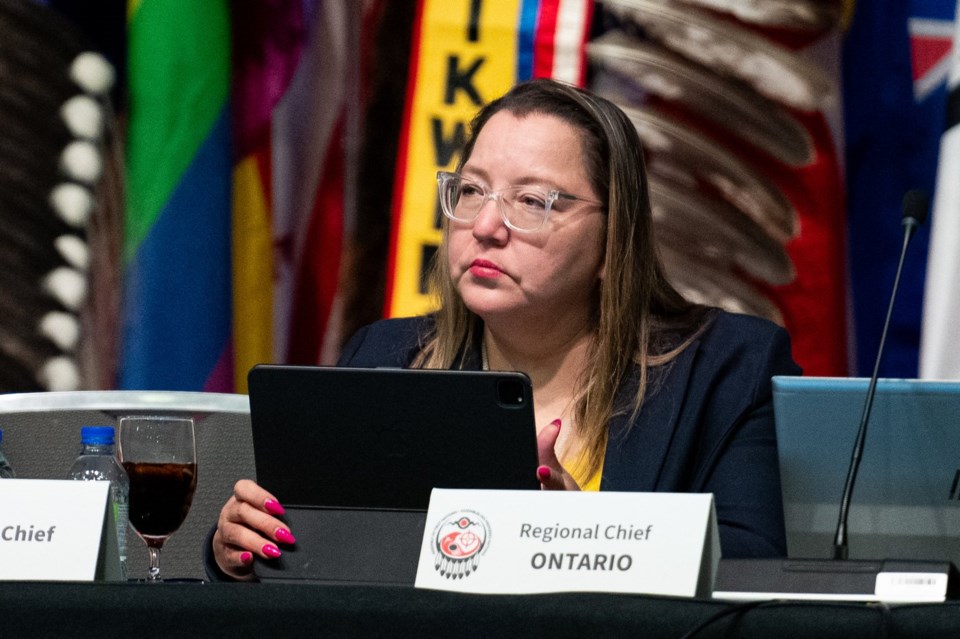OTTAWA — The national chief of the Assembly of First Nations is calling on all members of Parliament to send a First Nations water bill to the Senate before the holiday break, saying the water crisis demands urgent action.
"This legislation reflects years of advocacy by First Nations and marks a milestone in a decades-long fight for adequate water and wastewater in First Nations across Canada," Cindy Woodhouse Nepinak wrote in an open letter to MPs.
"We cannot afford further delays to this legislation or missed opportunities while First Nations continue to live without access to safe and clean water. Bill C-61 must advance now, not next year. We urge all members of Parliament, across all party lines, to act."
The government legislation known as Bill C-61 recognizes that First Nations have an inherent right to clean drinking water and commits the government to provide adequate and sustainable funding for water services in First Nations.
The House of Commons has been gridlocked since late September because of an ongoing privilege debate that centres on a request for the Liberals to hand over to Parliament and the RCMP unredacted documents about misspending at a now-defunct green tech fund.
That has taken precedence over nearly all other government business, and the water bill is awaiting a final vote in the House of Commons.
Last week, Liberal MP Jaime Battiste, who is Mi'kmaq from Eskasoni First Nation, asked for unanimous consent from MPs to adopt the bill and send it to Senate. But several Conservative MPs said no. The Conservatives then introduced a unanimous consent motion of their own that also asked MPs to condemn the Liberals for their inaction on the file. That, too, was voted down.
Chiefs who gathered with Battiste and Indigenous Services Minister Patty Hajdu last week expressed their disappointment with the bill not moving forward, and accused Conservative House leader Andrew Scheer of using the bill as a political tactic.
"I'm very disappointed that he used clean drinking water as a tactic in this House in order to say, 'If you do this, then we will do this,' where there's real lives that are being affected," Cowessess First Nation Chief Erica Beaudin told reporters at a news conference.
"We're not talking about toys, we're not talking about items that are not essential, but water is essential and you either believe in clean drinking water for everybody or you don't. And if you do, you do everything you possibly can to work toward that happening."
There are 31 long-term boil water advisories on First Nations across the country, and 36 short-term advisories, government data shows.
In a statement last week, Scheer said the Liberals shut down his motion because they would like to avoid "proper debate" on the legislation.
"Liberal MPs should be outraged with themselves. They could properly debate this legislation today if they stopped their cover up of their $400 million green slush fund scandal by providing the documents to the RCMP as ordered by Parliament," Scheer said.
Since Bill C-61 was introduced nearly a year ago it has been subject to debate in the House of Commons, studied at committee and had amendments tacked on.
At the Assembly of First Nations gathering last week, the AFN executive passed a resolution to continue advocating for the bill's approval.
Hajdu and Woodhouse Nepinak stood together in October making a similar push for the bill to move forward, with Hajdu blaming the Conservatives for delays.
Scheer, in response, pointed back to that privilege debate and said the House can resume its work once the Liberals hand over the documents.
It's unclear whether the Liberals will attempt a unanimous consent motion again before the holidays. They are expected to introduce the fall economic statement on Monday, and the House of Commons is set to rise on Tuesday for a break that last until Jan. 27.
In her letter to MPs, Woodhouse Nepinak said advancing the bill before then will demonstrate Canada's commitment to upholding its responsibilities.
"Support and prioritize the advancement of Bill C-61, refer it to the Senate, and take this necessary step toward ensuring every First Nation has access to the clean and safe drinking water, as it is their basic human right," she said.
This report by The 91Ô´´ Press was first published Dec. 13, 2024.
— With files from David Baxter
Alessia Passafiume, The 91Ô´´ Press



